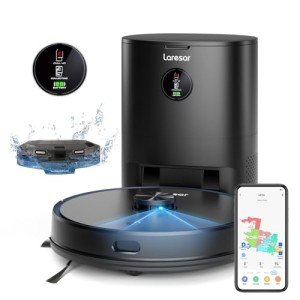Robotic Vacuum Cleaner Commercial: Revolutionizing Home Cleaning
Over the last few years, robotic vacuum cleaners have actually become a cutting-edge development in home cleaning innovation. With their automated features and intelligent navigation systems, these devices have actually changed the way people maintain cleanliness in their home. This short article intends to explore the performances, benefits, and future of robotic vacuum cleaners, showcasing their role in modern-day households.
Introduction of Robotic Vacuum Cleaners
Robotic vacuum are self-governing gadgets developed to carry out cleaning tasks without requiring manual intervention. Making use of advanced sensors, artificial intelligence, and a host of other technologies, these appliances can browse throughout a home, choosing up dirt, dust, and debris from numerous surface areas while preventing obstacles.
Key Features of Robotic Vacuum Cleaners
Robotic vacuum cleaners come geared up with a variety of functions that improve their functionality:
| Feature | Description |
|---|---|
| Navigation Systems | Use numerous technologies like laser mapping and video cameras to browse effectively |
| Automatic Charging | Return to docking stations to charge when battery levels are low |
| Scheduling | Users can configure cleaning schedules for specific times and days |
| Smart Home Integration | Get in touch with other smart devices for improved functionality |
| Several Cleaning Modes | Adapt cleaning designs based upon the kind of surface being cleaned up |
| App Control | Permit users to manage settings, receive alerts, and start/stop cleaning remotely |
Advantages of Robotic Vacuum Cleaners
- Time-Saving: With robotic vacuums, users can assign their time to other essential tasks while the device manages the cleaning. This benefit is a significant selling point for busy homes.
- Constant Cleaning: Robotic vacuum cleaners can perform everyday cleaning tasks, making sure that dirt and dust do not collect, leading to a healthier indoor environment.
- Energy Efficiency: Most robotic vacuums promote energy efficiency, often utilizing less power than standard vacuum cleaners, thus decreasing electrical power bills.
- Smart Technology: With functions like real-time mapping, users can monitor the cleaning process. Some advanced models even supply information on cleansings, such as locations covered and the amount of dirt recorded.
- Availability: Robotic vacuums are especially helpful for the elderly or individuals with mobility problems, streamlining the cleaning process without the need for physical effort.
Disadvantages of Robotic Vacuum Cleaners
In spite of their many benefits, robotic vacuum also have restrictions:
- Limited Suction Power: While they are effective for day-to-day upkeep, they might not be as powerful as conventional vacuums for deep cleaning.
- Obstacle Navigation: Some robotic models might battle with intricate layouts, stairs, or high-pile carpets.
- Battery Life: Most robotic vacuums included limited battery life, implying larger homes might need numerous charging cycles to cover all locations.
- Expense: High-quality models can be costly compared to standard vacuum cleaners.
Choosing the Right Robotic Vacuum Cleaner
With various choices offered in the market, selecting the best robotic vacuum cleaner can be a challenging task. Here are some factors to consider:
- Home Size: Larger homes may need models with longer battery life and larger dust bins.
- Surface area Types: Consider a design that works well on particular surface areas in your home, such as hardwood, carpet, or tiles.
- Smart Features: Evaluate the level of smart integration if you prefer remote operation and monitoring by means of a mobile phone app.
- Brand Reputation: Opt for reputable brand names known for trustworthy products and good client service.
Suggested Robotic Vacuum Cleaners
| Brand | Model | Key Features | Price Range |
|---|---|---|---|
| iRobot | Roomba s9+ | Advanced mapping, powerful suction | ₤ 949-₤ 1,099 |
| Roborock | Roborock S7 | Sonic mopping, customizable cleaning courses | ₤ 649-₤ 749 |
| Eufy | RoboVac 30C | Affordable, strong suction, app control | ₤ 250-₤ 300 |
| Neato | D7 Connected | Distinct D-shape design, zone cleaning software | ₤ 599-₤ 700 |
| Shark | IQ Robot | Self-emptying base, smart mapping | ₤ 599-₤ 699 |
Future of Robotic Vacuum Cleaners
As technology advances, the future of robotic vacuum cleaners looks appealing. The integration of AI and artificial intelligence systems is expected to enhance navigation capabilities. Emerging trends consist of:
- Enhanced Interaction: Future models might include integrated voice assistants, making it possible for users to issue cleaning commands through voice.
- Enhanced Sensors: Enhanced sensors might cause much better barrier acknowledgment, allowing the vacuum to work more efficiently in cluttered spaces.
- Multi-Functionality: Future robotic vacuums might handle additional chores, such as mopping or window cleaning, consolidating several cleaning jobs into one device.
Frequently Asked Questions About Robotic Vacuum Cleaners
1. Just how much do robotic vacuum cleaners normally cost?
The price can vary extensively, varying from ₤ 200 to over ₤ 1,000, depending on functions and brand.
2. Related Web Page ?
Yes, lots of contemporary robotic vacuum cleaners are designed with powerful suction systems that can clean up different carpet types.
3. Do robotic vacuum cleaners need much maintenance?
Maintenance is reasonably low; however, users must frequently clean the filters, empty dust bins, and periodically inspect the brushes for blockages.
4. For how long does a robotic vacuum operate on a single charge?
Many robotic vacuums can run for about 60 to 120 minutes, depending on the model and cleaning conditions.
5. Can I arrange my robotic vacuum to clean up when I'm not home?
Yes, a lot of robotic vacuum include scheduling features that allow users to set specific times for cleaning.
Robotic vacuum are not just devices; they represent a significant development in home cleaning technology. By making cleaning tasks simpler and more efficient, they allow users to take pleasure in a cleaner living environment with very little effort. As innovation progresses, it is most likely that these devices will end up being a lot more sophisticated, paving the way for a smarter, clutter-free future.

